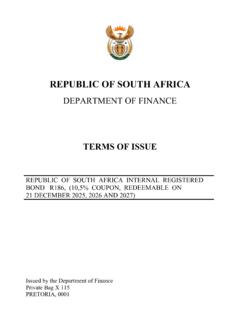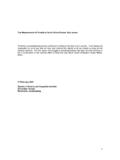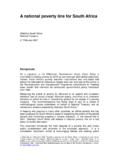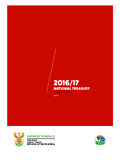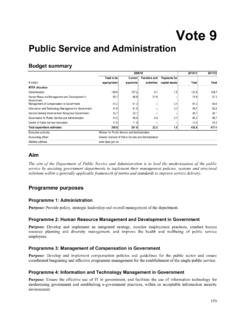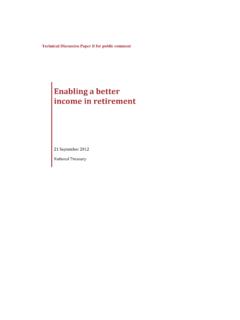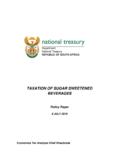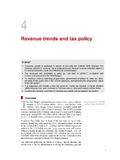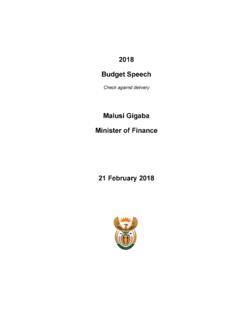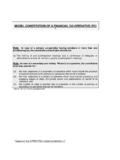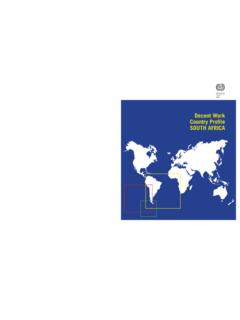Transcription of Social security - National Treasury
1 6. Social security Improved economic performance and the strength of south Africa's finances have created room for further steps in Social security reform. Alongside expanding employment opportunities and targeted Social assistance, the period ahead will see consideration given to a contributory earnings-related savings and Social insurance framework, accompanied by a wage subsidy for those with incomes below the personal income tax threshold. Social assistance programmes currently provide income support to 11,8 million people. The south African Social security Agency is now operational, and improvements are in progress in the administration of the Unemployment Insurance Fund, the Compensation Funds and the Road Accident Fund.
2 Ending poverty and reducing inequality are central goals of south Africa's reconstruction and development challenge. The introduction of an official poverty index by Statistics south Africa in 2007 and a new income dynamics survey will allow progress towards eliminating absolute poverty and reducing vulnerability to be more reliably monitored. The construction, over time, of a comprehensive Social security system will bring substantial changes to the existing Social insurance funds, enhancement of administrative arrangements, a new tax structure and adjustments to employee benefits across the economy. This reform project will touch all south Africans and its impact will extend across the entire labour market. Its implementation calls for a new Social partnership constructed on the principles of equity and solidarity, building on both public administration reforms and effective mobilisation of private-sector capacity.
3 Poverty reduction and Social protection Towards comprehensive Social security south Africa's Social development strategy rests on the Meeting basic needs is Reconstruction and Development Programme (RDP) adopted by a core objective of the government in 1994 as both a framework for policy and a programme RDP. of transformation in response to the inherited legacy of discrimination and inequality. It comprised five broad programmes: meeting basic needs, human resource development, building the economy, democratising the state and society, and implementation through improved government coordination and planning. 99. 2007 Budget Review Comprehensive Social security and the RDP. The 1994 Reconstruction and Development Programme identified developmental Social welfare as one of the key elements of meeting basic needs ensuring delivery of benefits to the poorest, improved Social insurance for the employed and unemployed, Social assistance to those most at risk, protection of the rights of children, greater community involvement and inter-sectoral coordination.
4 Reform of Social development services during the 1990s focused on integrating the formerly fragmented welfare services and development programmes, improving Social grants payments processes, introduction of the child support grant, and construction of new partnerships with non-governmental and community-based organisations. In 2002, the Committee of Inquiry into a Comprehensive System of Social security for south Africa published its main report, Transforming the Present Protecting the Future, providing a detailed exposition of shortcomings in south African Social protection arrangements, and outlining recommendations for broadening Social insurance and implementing a comprehensive and integrated medium- to long-term framework for income support.
5 The committee emphasised (p. 154): the attainment of positive-sum' policy interventions, rather than narrow policy trade-offs between Social and economic policy objectives (By) creating greater income security the poor, who are currently trapped in survivalist and low-income informal work, become empowered to risk pursuing higher-return activities that can break their cycle of poverty . Key recommendations of the report included the following: x The need for mandatory insurance cover for all participants in the formal employment sector, and their dependants. x Mechanisms for voluntary contributions to Social insurance for those who cannot realistically be covered by mandatory arrangements. x Adoption of an official poverty line, and improved data and research on poverty and human development.
6 X A phased and measured introduction of a comprehensive system of income support, on the strength of improvements over time in fiscal and administrative capacity. x Continued active labour market and job-creation policies alongside extension of Social insurance to all workers. x Special attention to the needs of children, in particular orphans and child-headed households. x A phased reform of health care financing towards mandatory, universal coverage. x An integrated approach to retirement provision, based on mandatory participation, preservation of benefits, improved fund administration and governance, simplification of the tax structure and improved consumer protection. x Improved disability insurance and compensation for occupational injury and disease, as well as reform of road accident benefits, as part of a new Social insurance framework.
7 The committee recommended a mixed financing framework, including contributory and non-contributory elements, and recognising the role of both government funds and private-sector arrangements in the overall Social security system. Despite buoyant Given the legacy of fragmented government institutions and economic income growth, poverty decline in the previous era, the challenges of the first decade of and unemployment democracy were largely about transforming government service remain challenges delivery and economic reforms. Government expenditure programmes contributed mainly to non-income household welfare from 1993- 1999,1 whereas from 2000 onwards, economic and fiscal reforms have also yielded more buoyant income growth and employment creation.
8 But unemployment has remained high and poor households continue 1. The contribution of government service delivery to reducing asset poverty and inequality is assessed in H Bhorat, P Naidoo and C v d Westhuizen, Shifts in Non- Income Welfare in south Africa: 1993-2004, Development Policy Research Unit, University of Cape Town, 2006. See also Haroon Bhorat and Ravi Kanbur, eds., Poverty and Policy in Post-Apartheid south Africa, HSRC Press 2006. 100. Chapter 6: Social security to rely strongly on Social grants or remittances from other family members. Vulnerability to illness or disability, absence or irregularity of work, and the burden of caring for others keeps far too many people trapped in a cycle of poverty and inadequate opportunity.
9 Recognising that poverty and vulnerability have many aspects, Development is government's Social development programmes have included a wide supported through a range of initiatives focused on broadening participation. Skills wide range of policies development, access to health and welfare services, public works and programmes employment, housing, water, electricity, sanitation, nutrition and small enterprise development have seen marked expansions in budget allocations. As discussed elsewhere in this Budget Review, the 2007 Budget provides for continued growth in these and other activities, removal of fees as a barrier to schooling, completion of the land restitution programme, a new adult education initiative and a range of community development programmes to complement housing and municipal infrastructure investment.
10 Expansion of the Social assistance safety net has been prioritised over Social assistance has the past decade. Largely attributable to the phasing in of a child grown to nearly support grant, the number of beneficiaries of Social assistance has 12 million beneficiaries increased from under 3 million in 1997 to 11,8 million today, and over past decade consolidated expenditure on welfare and Social security has increased from R23,6 billion in 1997/98 (3,4 per cent of GDP) to a projected R89,4 billion in 2007/08 (4,6 per cent of GDP). Table illustrates that the proportion of the poorest 20 per cent of households reporting pensions or grants as their main source of income increased from 16,1 per cent in 2002 to 39,6 per cent in 2005.
